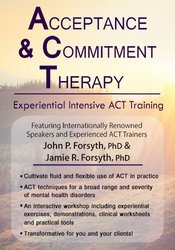

How often do you review your appointment calendar and start wondering how you’re going to, finally, help a regular client who seems to progress for a while – and then regress?
Each time he/she arrives, you use the same tools and techniques you’ve used for so long – and mostly successfully – but this one client is testing your skills. Now, you can begin to integrate Acceptance and Commitment Therapy (ACT) into your practice – and see improved outcomes.
Researched and developed by world-renowned researcher, speaker and author Steven Hayes, PhD, ACT has fast become the treatment approach that gets to the heart of human suffering and what is needed to restore psychological health and wellness.
Join ACT experts, Drs. John & Jamie Forsyth for this workshop where you will develop highly practical, evidence-based skills, case conceptualization techniques, and powerful therapeutic strategies that will help you when working with a broad range of mental health concerns including:
View this intensive, engaging and transformative workshop and start a new path for healing you can use with your most difficult clients.
This online program is worth 12.25 hours CPD.
| File type | File name | Number of pages | |
|---|---|---|---|
| Manual (65.77 MB) | 98 Pages | Available after Purchase |
John P. Forsyth, Ph.D., is a clinical psychologist, professor, and directs the Anxiety Disorders Research Program at the University at Albany. He is an internationally renowned author, speaker, and trainer, and leads workshops worldwide on Acceptance and Commitment Therapy and mindfulness to cultivate psychological health and wellness. www.drjohnforsyth.com
Speaker Disclosure:
Financial: John Forsyth is a Professor of Psychology at the University at Albany, State University of New York. Dr. Forsyth is faculty director of the Anxiety Disorders Research Program. He is an author for New Harbinger Publications, Inc. and receives royalties. He receives a speaking honorarium from PESI, Inc. He has no relevant financial relationships with ineligible organizations.
Non-financial: John Forsyth is a member of the Association for Contextual Behavioral Science.
Jamie R. Forsyth, Ph.D., is a clinical psychologist, a gifted clinician, clinical supervisor, and trainer, with expertise in the use of Acceptance and Commitment Therapy with severe forms of psychological suffering (e.g., schizophrenia, personality disorders) in both inpatient and outpatient settings. Her work, grounded in evidence-based know-how, offers unique insights into the subtle nuances of ACT as it unfolds in life and mental health settings.
Speaker Disclosure:
Financial: Jamie Forsyth is a clinician at Union College. She receives a speaking honorarium from PESI, Inc. She has no relevant financial relationships with ineligible organizations.
Non-financial: Jamie Forsyth is a member of the Association for Contextual Behavior Science.
ACT Model and Case Conceptualization
Use Creative Hopelessness to Weaken the Control Agenda
Do Effective Values Work in ACT
Cultivate Mindful Acceptance & Defusion
Nurture Self-Compassion, Willingness, and Value-Guided action
| 5 |
|
| 4 |
|
| 3 |
|
| 2 |
|
| 1 |
|
Satisfaction Guarantee
Your satisfaction is our goal and our guarantee. Concerns should be addressed to info@pesi.co.uk or call 01235847393.
Please wait ...